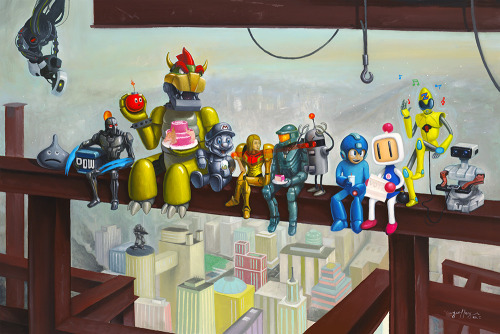Prints available for purchase from StoreEnvy. US$45
Andy Baio of Waxy.org wrote about an experiment of sorts he carried out with his son, by introducing him to videogames in chronological order. I’ve seen a lot of different opinions of this, but it seems to me like a lovely story of a parent being active in playing games with their kid.
At Arcade Review, Alex Pieschel writes a detailed history of glitches as aesthetic, discovery, and performance. The entire time I was reading it, I was thinking about Wreck-It Ralph.
Best Games of 2014 as chosen by: Crave | GadgetReview | Slant | Wired | VG 24/7
Claire Hosking provides an Australian perspective on the recent Grand Theft Auto ban in the country's Target and K-Mart chains. Hosking discusses the difference between Australian and U.S. perspectives on speech as it relates to the ban.
Corey Milne uses the recent news about Greece’s pleas to have their artifacts returned to them rather than loaned out by the British Museum to draw parallels to the Uncharted series. Milne argues that Nathan Drake is nothing like Indiana Jones, but is more accurately a thief with no respect for other cultures. In a similar vein, professional archaeologist Sarah Ingram plays through Tomb Raider and observes that the game’s more aligned with treasure collecting than archaeology.
The Crate and Crowbar discuss the things we do in games we’d like others not to see.
Dan Golding’s new podcast “A Short History of Video Games” discusses video game history across the generations.
Erik Kain picks The Biggest Video Game Controversies Of 2014. #GamerGate obviously takes the top slot, but when Destiny comes in at number two, it feels like it cheapens the gravity of the remainder of the list.
The Fall of THQ: At its peak in 2007, the company owned more than 15 game studios, most of which were part of the well-oiled licensed games machine. It had $500 million cash in the bank and revenue exceeding a billion dollars. It was printing cash. By 2013, its shares had plummeted to 11 cents each.
The Fiscal Times reminds us of The 10 Best-Selling Video Games of 2014, though it's not really a complete list until you've tallied in Christmas sales.
At GameSound, Kenny Young shares an email conversation he had with the late Ralph Baer about the development of game audio through history.
How Chan-Style Anonymous Culture Shapes #gamergate This is a really fascinating breakdown–I just wish it were an essay instead of about a million tweets.
Play/Paws scrutinizes of Transistor’s themes, such as censorship and surveillance.
At Play the Past, historian and teacher Christopher Sawula explains what makes Valiant Hearts the only one worth using to help students understand the social and cultural contexts of World War I.
Pop Matters writes about what happens when those saved games reveal uncomfortable truths about your past self in the form of video game saves: "Such phenomenon occur in other areas of life all the time. People return home for the holidays and find their high school posters and bedsheets, items that betray the embarrassing fandoms that they belonged to in adolescence. "
Sim City 2000 is now free to download for the remainder of the year. I played it for about twenty minutes before realizing that I was remembering it being MUCH, MUCH more fun than it actually was.
Spend a while at The Obscuritory, learning about obscure games.
The Tampa Bay Times calls video games the Hottest intercollegiate sport. Great. Had I been born fifteen years later, I could have been a jock.
Why 2014 was a Troubling Year for Video Games

No comments:
Post a Comment